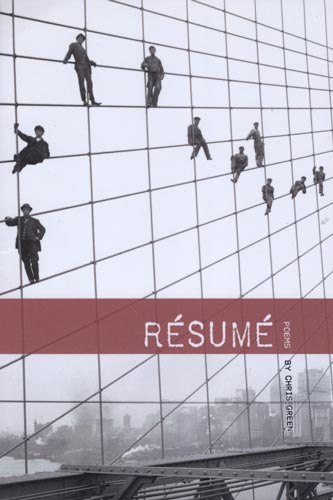Résumé
In the dedication Chris Green states that there is “no straightforward compensation.” The rest of the poems follow Joseph Brodsky’s quote during his employment trial, “Everything was interesting to me. I changed jobs because I wanted to learn more about life, about people.” There is a Midwestern, blue collar motif to the language that runs through the poems. There is plenty of indirect and direct evidence of the observations of a poet from Chicago. Many times I thought of Nickel and Dimed, Barbara Ehrenreich’s exposé on living a low-wage lifestyle. In the dedication Chris Green states that there is “no straightforward compensation.” The rest of the poems follow Joseph Brodsky’s quote during his employment trial, “Everything was interesting to me. I changed jobs because I wanted to learn more about life, about people.” There is a Midwestern, blue collar motif to the language that runs through the poems. There is plenty of indirect and direct evidence of the observations of a poet from Chicago. Many times I thought of Nickel and Dimed, Barbara Ehrenreich’s exposé on living a low-wage lifestyle. The beauty of Résumé, Chris Green’s similar, poetic attempt at Ehrenreich’s social experiment, is that his was not an experiment. In the fabrication of these poems and the beautification of life, he reaches deeper truths than the portrayal of actual reality. Art is at its most satisfactory when accomplishing this notion.
The opening poem depicts setting pins in a bowling alley. Chris prepares the reader to feel that every poem—every job—are all variations of the same. This insight is often explored in good art: life’s differences and nuances are all secondary to the unity they hide. There is an expectation to hear poems that are full of grit. The language of James Wright’s “Autumn Begins in Martin’s Ferry, Ohio” is present. The cast is similar, but modern. It is a way of paying homage. Wright practiced form to the brink and structure burst at his seams until he finally released himself from it. This is where Green picks up. In the poem “Christmas Canner,” he explains the nature of a job in which he helped people ‘can’ bizarre items like fur coats.
I was so fourteen years old,
a boy performing something utterly weird
without irony,
As a standalone line, it can be seen that the poet never grows up in that sense. Jobs are weird and foreign. Observation and refinement of thought are his only true occupation. The poems act with a tactile presence. The reader is allowed entry to so much knowledge through the universal in and out of all these positions. The liberal accounts of low wage jobs skew in the direction of sympathy. These poems are oblivious to that need or desire. Each one works to provide illumination to the condition we find ourselves in. The work is effective in reaching to the interior of the reader because the reader really does not find contest in it. There is nothing to oppose. The opinions slip beautifully in like in “Young Good Salesman” discussing office life:
no one is on the verge of a supreme insight.
No one says, for instance, A man and a woman
and a blackbird are one.
This line from Wallace Stevens is acknowledged at the end of the book, but even without knowing the originator, it is powerful and nearly breathtaking. Chris Green is working the united philosophy throughout the poems. The fact that office life kills appreciation is nearly trite and superficial at times, but to hear it as dull and void of insight because it lacks poetry itself is more to the heart of the matter. Out the office window, the trees and nature may call, but poetry and art can still be overlooked. The recycling of lines also places him in a hierarchy of poets that resembles the jobs he discusses. This is another submission that social exposé pieces fail to concede.
The poems are a well-rounded account of actual events and work to provide reasoning for life’s whimsy. A child is blocking him when he is jobless. A wife inspires him when he is jobless. Jack Kerouac is mentioned several times, along with Mark Strand and George Herbert. In one poem, guarding a contemporary art museum, there is a realization that the job is to realize that “art is born, changes and dies.” It is constantly moving.
The final poem pays such deep homage and makes use of the recycling technique that cuts corners and saves the boss dough. It requires an education and persuades the reader to seek one to fully understand it. But a few poems before, in a poem called “Poet,” the speaker learns from his daughter. A simple four-year-old girl holds the keys to much of the wisdom in Résumé. The final line of the poem says “things undie in the spring.” This is akin to the resurrection of new work and changes on the horizon. Résumé suggests rewards of infinite possibility if you’re willing to work for it.





